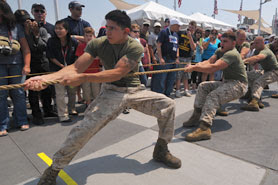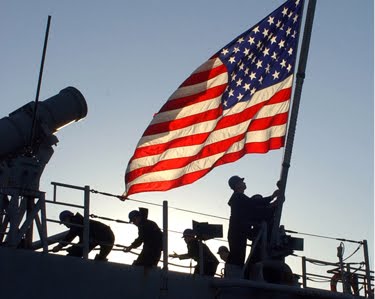The men and women in the military make great sacrifices for us at home. They live away from their loved ones for months at a time with limited contact. This is hard on them, and their loved ones, especially spouses. They are left to take care of things on the home front while their significant other is deployed.
Sarah Croop is and army wife currently living in Anchorage, Alaska. My cousin led me to her when I told her about my military blog. Sarah’s husband just recently got out of the army.
She is 25 years-old, he is 26. They met working at a restaurant when she attended Drexel and he, Temple. She is a graphic designer and worked in Pennsylvania, Florida and now Alaska, where she freelances for the company she worked for in Florida. They got in married in June

2007 while he was on R&R (leave) during a tour in Iraq. He has also been to Afghanistan until this January. Now, at the end of his service, they are moving back to Pennsylvania to be closer to their families.
While she enjoyed moving to Alaska because she loves to travel and she knew it wouldn’t be permanent, she never liked the frequent packing and moving. Often times she did it alone. “In some cases, the military helps with this, but I fell under some loopholes and had to do it myself.” While he was gone, the hardest things she had to face were the holidays. Also, things like a car breaking down would leave her in shambles because no one was there to help.
Living on base though, wasn’t as tough. “One thing that surprised me about being a military wife is that there are a lot of people willing to step up and help when needed. Friends I've only known a few months, military wives I've barely met, or guys that work with my husband have at one point all helped me out with a situation I couldn't handle on my own. It creates strong bonds between people and good friends to miss when you leave.”
Since Sarah and her husband do not have children, she didn’t feel too many extra burdens. Only having to take care of herself made housework, cooking and laundry manageable, while other mili

tary spouses have children to take care of also. “I did feel a huge extra burden when it came to moving in and out of our apartments. I had to deal with a large majority of it myself which became extremely stressful on me.”
Depending on what you do in the military, depends on how often you have access to phones and internet. “Having him away for a year at a time is hard, but for us we had very limited communication. Often times, phones, internet, and mail were unreliable. I would spend weeks at a time worrying and wondering if he was ok. I felt that it had a serious effect on my daily life to be so worried all the time and rarely hear any news.”
There are tons of blogs written by military spouses. Some get picked up by Milblogging(
http://www.milblogging.com/) which has a database dedicated to military blogs. Spousebuzz is strictly for military spouses to input their personal experiences and offer support to other in their situation. Other bloggers who do not get picked up usually have a lot to say against the military and government, but still are interesting (
http://www.spousebuzz.com/).
With the growing popularity of blogs, these spouses, mostly women, have another outlet and support system while their spouse is away. Sarah has a blog, but is not a daily record of her daily routines and thoughts, but inspirational quotes and lyrics that get her through the day and hopefully others (
http://armywifeinspirations.blogspot.com/).
 men duke it out in an intense match of tug-of-war. They also hold ceremonies on Memorial Day, unfurling the American Flag, paying tribute to those who gave their lives for their country.
men duke it out in an intense match of tug-of-war. They also hold ceremonies on Memorial Day, unfurling the American Flag, paying tribute to those who gave their lives for their country.









